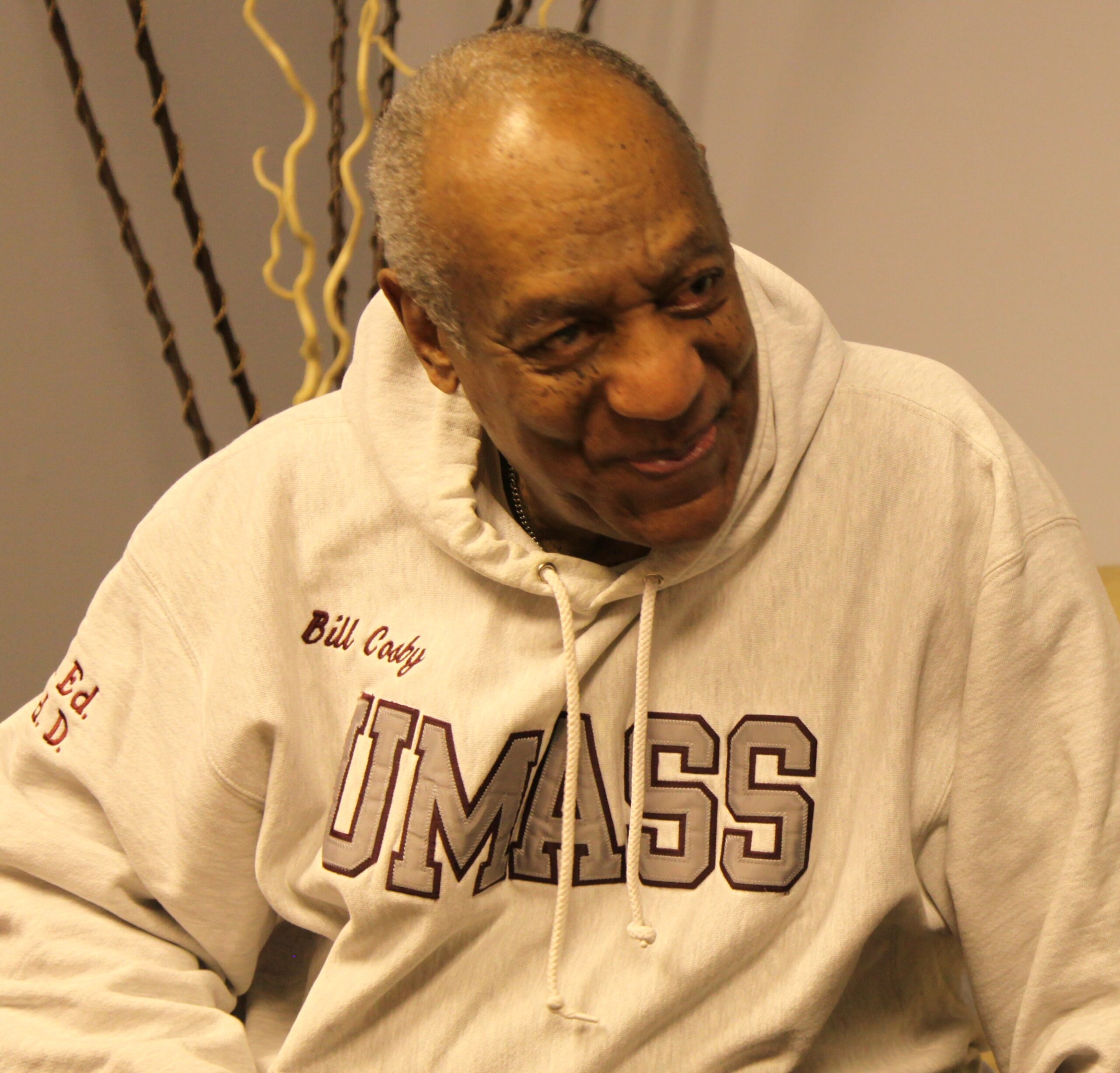The former comedian is out of jail, but his own sworn deposition confirms that he is a rapist.
When I was 21 years old, I was drugged and raped by a man I met in college. I didn’t tell this story to anybody, including myself, until December 2014, when a series of women–some famous, some not–came forward to describe in unsparing detail what it was like to be sexually violated by “America’s Dad,” Bill Cosby. After reading Beverly Johnson’s story in Vanity Fair, in which she recounted how Cosby lured her into his home under false pretenses and gave her a coffee—“My head became woozy, my speech became slurred, and the room began to spin nonstop”—I could no longer deny that a similar thing had once happened to me. I read each new account, seeing myself over and over again in these women’s horror stories, and decided, finally, to tell my own.
It was with disappointment—though, honestly, not much surprise—that I saw Cosby trending on Twitter on June 30; the Supreme Court of Pennsylvania had overturned his 2018 conviction on three felony counts for drugging and raping Andrea Constand, a former employee of Temple University. By then, Cosby, who is Temple’s most famous alumnus, had already served almost three years of his three-to-10 year sentence in a maximum security prison. When he walked out of there he flashed the “V” for victory sign at his supporters, as though his release from jail represented some kind of exoneration.
Victims and their advocates were understandably devastated, expressing concern that the decision would discourage women from reporting sexual assault in the future.
“The semblance of justice these women had in knowing Cosby was convicted has been completely erased with his release today,” wrote Time’s Up chief executive Tina Tchen in a statement.
“Bill Cosby is free on a technicality, but the women he assaulted, who bravely came forward to bring him to justice, are suffering anew,” said the National Organization for Women in a press release.
“I fear that this is going to really hinder other survivors from coming forward,” Angela Rose, founder and president of Promoting Awareness Victim Empowerment told NPR.
Attorney Gloria Allred, who has represented almost half of the Cosby victims, was asked in an interview if she thought that the decision was a blow to the #MeToo movement; she paused before delivering her assessment: “It’s not a win.”
I do not believe the decision to set Cosby free is a blow to the #MeToo movement, or that it will discourage women from speaking out in the future. Nor do I think that justice has been completely erased. Cosby can make a “V” sign with his hands as often as he likes, but he has not scored a victory; he was not exonerated, but rather freed on a technicality. His premature release from prison is just another example of the Patriarchy Industrial Complex on full display, with rich men paying their expensive lawyers to identify procedural loopholes so they can wiggle their way out of consequences for their behavior.
In a 79-page opinion that led to Cosby’s release from prison, the Pennsylvania Supreme Court wrote that Cosby should not have been tried in criminal court, owing to a non-prosecution deal that his lawyers cut years earlier with former Montgomery County District Attorney Bruce Castor. If that name rings a bell, it’s because Castor went on to become Donald Trump’s lawyer in his second impeachment trial. (Remember the guy in a boxy pinstripe suit that was two sizes too big, delivering non sequiturs about how “Nebraska is quite a judicial thinking place”? Yeah, that’s him.)
Cosby’s agreement with Castor was similar to the sweetheart deal that pedophile Jeffrey Epstein obtained in 2008 from another Trumpworld lackey: Alex Acosta, the former U.S. Attorney for the Southern District of Florida. Acosta rose to become Trump’s Secretary of Labor—a position from which he was forced to resign in 2019 after Epstein’s second arrest. As the former President likes to say: only the best people.
In 2015, upon learning that Risa Ferman, then District Attorney of Montgomery County, was reopening the criminal case against Cosby after several more of his victims came forward, Bruce Castor informed her by email of the 2005 non-prosecution agreement. This was the first she had heard of it. In response to Ferman’s request that Castor send her a copy of the binding legal agreement, he instead sent her a press release–a press release!–claiming it was actually a “written declaration” that had been approved by Constand’s lawyers.
One need not be trained in the law to know that a press release does not constitute a legally enforceable document. I am thus extremely curious as to why the justices on the Pennsylvania Supreme Court ruled, in a split decision, that Castor’s oral promise to Cosby’s attorneys was binding.
In a statement released June 30, Constand’s lawyers asserted that they “were not signatories to any agreement of any kind” and that Castor’s press release “had no meaning or significance to us in 2005 other than being a press release circulated by the then-District Attorney.” Was there a non-prosecution agreement or was there not a non-prosecution agreement? Once again, we find ourselves in familiar territory—her word against his.
The bigger, more consequential question is why Castor gave Cosby any type of assurance, whether verbal or written, that he wouldn’t face future criminal prosecution. His stated reasons speak volumes about the discrimination against sexual assault survivors that is embedded in our judicial system.
Without even interviewing Andrea Constand, Castor determined in 2005 that there was not enough evidence to successfully prosecute a criminal case against Cosby. His reasons: The victim waited a year to come forward with her allegations; and she stayed in contact with her attacker after the assault.
Anyone who has been sexually assaulted can explain how and why fear and shame prevent them from going to the police, as can the many psychologists who were interviewed by major media outlets in recent years about this common behavior pattern. Victims stay in touch with their rapists—I know I did—because their brains are paralyzed, trapped in survival mode, trying to deny the enormity of what has taken place, particularly when the crime is committed by someone they know and trust. Such cognitive dissonance, as Cosby’s victims can attest, can take a very long time to overcome. In my own case, it took 16 years.
Constand prevailed in her civil lawsuit against Cosby, winning a $3.4 million settlement in 2006. Cosby testified in a sworn deposition that he had obtained prescription Quaaludes, which render a person physically immobile, with the intent of giving them to women with whom he wanted to have sex. Nine years later, after new accusers came forward, the Associated Press successfully petitioned the court to unseal the records of the civil trial. This is what led to Cosby’s re-arrest and trial for aggravated sexual assault against Constand: He incriminated himself with his own words, spoken in a sworn deposition more than a decade earlier.
The timeline that led to Cosby’s re-arrest and trial was miraculous: In July 2015 a judge agreed to unseal the documents; on November 3, voters elected a new district attorney, Kevin R. Steele, who then helped bring charges against Cosby; and on December 30 the former actor was arrested, just days before the 12-year statute of limitations on Constand’s criminal complaint was set to expire.
Cosby’s attorneys argued unsuccessfully that the deposition he had given in Constand’s civil suit should be inadmissible, because their client had made his incriminating statements only because he believed he had immunity from criminal prosecution. By then more than 50 women had come forward, all with disturbingly similar stories about Cosby drugging and raping them. In July 2015, New York Magazine published a striking black-and-white cover photo showing 35 of those women, seated and looking directly into the camera, under the headline: “I’m No Longer Afraid.” Five of those women testified at the 2018 trial that resulted in Cosby’s conviction.
View this post on Instagram
The outcome of that trial was shocking. Given his wealth, power, and all the systemic barriers rape victims face in our society, there was every reason to expect that Cosby would once again avoid prison. But the #MeToo movement laid the groundwork for victims to come forward, finding strength and solidarity with one another as they told the truth about Bill Cosby, Harvey Weinstein, and so many other men.
All things considered, when I think about Andrea Constand’s 14-year journey to see her rapist behind bars, I am reminded of the aphorism, “Don’t cry because it’s over. Smile because it happened.” This is not to say we shouldn’t be furious about the incompetence and malice of Bruce Castor, or about the Pennsylvania Supreme Court’s decision to believe his story about the non-prosecution agreement that might or might not actually exist. But we should stop and marvel that Cosby was convicted at all. His was the first big trial of a famous man in the wake of the #MeToo movement, and it resulted in an undeniable moment of reckoning. These women were telling the truth. There would be more to come.
We shouldn’t be surprised that Cosby obtained early release from prison. He’s an old, rich, entitled narcissist with nothing to lose by appealing the verdict. Constand, by contrast, had nothing to gain by revisiting her trauma. She had won her multi-million-dollar settlement in 2006, and was finally getting her life back, working as a massage therapist in Toronto. Still, she agreed to testify against Cosby at his 2017 trial, which resulted in a mistrial, and then again in 2018. She did this because she felt it was the right thing to do. The statute of limitations for all the other victims had run out. She was their only hope.
An accomplished college athlete who later oversaw operations for Temple University’s women’s basketball team, Constand knows how to play the long game. Her fight inspired sexual assault victims all over the world, including me, and led to the elimination of statutes of limitations in rape cases in several states. This is her legacy.
At 83 years old, Bill Cosby is technically a free man, in that he no longer lives behind bars. But he’s also a pariah in the entertainment industry, his reputation destroyed thanks to the #MeToo movement and its allies. Remember that it was Hannibal Burress, a Black male comedian, who ignited the media firestorm against Cosby by courageously calling him out as a rapist at Philadelphia’s Trocadero comedy club back in October 2014. Seven years later, as he faces another civil lawsuit for sexual battery in Los Angeles, Bill Cosby’s legacy will never amount to anything more than a sick joke.



